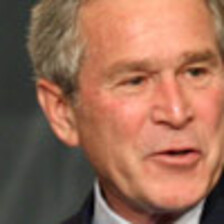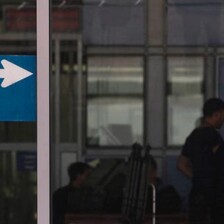The Jordan Times 24 April 2001
AMMAN—Despite a clear-cut case of massive human rights violations and the weight of international law on their side, Palestinians are losing the crucial war for international opinion, many political watchers and media analysts believe.
In reaction to the modern dimension of media-politics, Israel has conducted a vigorous media campaign, selling its interpretation of the Intifada to the world through politicians, analysts and spin doctors.
Media watchers say Israel’s PR machine is far more effective in manipulating images and gaining valuable media time and space.
Because of this, the Israeli media campaign promotes, protects and justifies the military and political actions of its government in a way the Palestinians seem unable to do.
Arab analysts and media circles say there emerges a picture of a Palestinian administration with no sustained media policy or unified message to present to the world. The result is an incoherent approach and uncertain image in the international media with nothing new to counter the sophisticated “spin” being placed on events by Israeli officials.
A Palestinian National Authority (PNA) insider admitted from personal experience that no centralised media policy exists within the Palestinian government and as a result, no unified message reaches the public, a view shared by most media analysts.
“Often, we don’t present evidence when we make allegations so nothing is proven and we don’t build trust with the media,” said the source while adding, “when no information is given by the PNA the international media de facto takes the Israeli side.”
The source, who requested anonymity, also commented: “We have a problem with the decision making process, not just with the media but politically as well, and it’s one of our biggest weaknesses.”
While in the Arab world the Palestinian struggle for freedom and independence seems a just one, many Western eyes only see the violence being committed, focusing on the symptom rather than the cause, a situation often attributed to the successful spin or contextualisation made by the Israeli media machine.
Political author and columnist Rami Khouri agrees: “There is a mixed image in the face of the rest of the world, on the one hand there’s sympathy as the Palestinian people bear the might of the Israeli army and the ferocity of its leadership, but they are also seen as throwing stones and the cause of the violence.”
“Israel has mounted a very effective campaign to push this idea forward in the media,” he said.
James Zogby, political observer and president of the Arab American Institute in Washington, which acts as the policy arm of Arab-Americans, expressed his clear frustration at the PNA’s refusal of help from his organisation.
“We saw the incitement campaign coming [from the Israeli side] two years ago and we asked the PNA to provide us with information so that it doesn’t become overwhelming,” he said, but nothing was done.
Zogby also mentioned that it is not as though media experts sympathetic to the Palestinian cause haven’t tried.
“Media savvy pros who worked in the Democratic and Republican presidential campaigns and were sensitive to the cause wanted to help, but [the Palestinians] refused, they just didn’t get it,” he says.
Ghassan Khatib, director of the Jerusalem Media and Communications Centre also believes the PNA regards the media campaign as a low priority.
“While I don’t expect the Palestinians to win the media battle because of the enormous resources and capabilities on the side of Israel, they are still not exploiting a resource available to them,” he said.
Khatib also pointed out that at the Camp David negotiations last summer, the Israeli delegation brought 20 media consultants and press secretaries, while the Palestinian side brought no one specialised in the handling of the media.
Many feel a pattern has emerged of the PNA reacting to events, not shaping, framing or directing the media as the Israeli side does, but simply responding to the challenges presented them, and this usually in a defensive manner.
In media parlance, a defensive or emotional image is near suicidal to a party trying to convey a rational argument to the public.
Press conferences often turn into question and answer sessions, allowing reporters to set the agenda, while the structured and controlled Israeli campaign rarely allows this to happen.
Even when powerful media images are made available to the Palestinians the opportunity they present is squandered.
Dureid Mahasneh, political columnist, believes the images of Mohammad Durra’s death were lost when a week later, Israeli soldiers were lynched and vandalism was perpetrated on the Jewish holy site of Joseph’s Tomb.
But this was not so for Israeli concerns when a 10-month old baby was shot inside an illegal Jewish settlement.
Israeli spokespeople and government ministers all appeared with photographs of the slain child, using terms like “unprecedented cruelty” in another salvo in the media war. The campaign succeeded in maximising the political mileage of the death and garnered strong reactions in the international media.
Analysts agree these successful images continue to resonate in the Western media to far greater effect while a daily, and much higher toll, of Palestinian deaths is all but eclipsed.
Daoud Kuttab, well-known Palestinian journalist and director of the Institute of Modern Media at Al Quds University in Jerusalem, sees the current uprising diluted in its power when compared to the previous intifada.
“This dose of firearms has weakened the argument of Palestinians as underdogs,” he said, while commenting on the particular timing of the uprising which came shortly after the Israeli labelled “generous” the offers on the table at Camp David. Again, it was an exercise in contextualisation which reflected badly on the Palestinian cause.
Yet this cause is a simple one to understand and according to Zogby, is the strongest case in the conflict, but Palestinians aren’t able to drive the point home.
“They assume their cause is just and therefore they will win, but if a just cause was all it took, the Indians would be running America right now,” he said.
“When your enemy defines you, you lose the debate, and in this case the Palestinians have been defined,” said Zogby. “George Bush [Sr.] was defined by Clinton as a failed president and he lost the election,” he reminded, explaining that this dynamic is a function of politics.
The heart of the problem, thinks Zogby, is that the Palestinian leadership has never taken the time to define themselves or the other side, “but this isn’t a war we need to lose,” he added, expressing his frustration.
As for the often repeated argument that the Western media is biased, Zogby simply thinks this is a form of abdication or surrender on the part of the Arab world.
Khouri also discounts the theory of media bias.
“There is tremendous receptivity to the [Palestinian] message in the West, people are always open to the truth and the story of a people fighting for their liberty,” he said.
Instead, Khouri looks to deeper reasons for reluctance in both media and political circles in the West.
“This is very much a cultural thing, an injustice has been done to us by the world and those who did the wrong should right it, but this is an uphill battle,” he said.
“The wrong done to the Jews is seen as the paradigm of evil in the West and the plight of Jews in Israel is seen in many cases as the supreme moral cause that needs to be supported,” he added.
Khouri, however, does not discount the power of Israeli lobby groups in America who have “tremendous power” over the political and social climate in the country.
Some maintain that ultimately, even with a failed media campaign, world opinion cannot ignore forever the voices of Palestinians.
“Eventually, people will start listening and realise what is happening is wrong,” believes Mahasneh.

